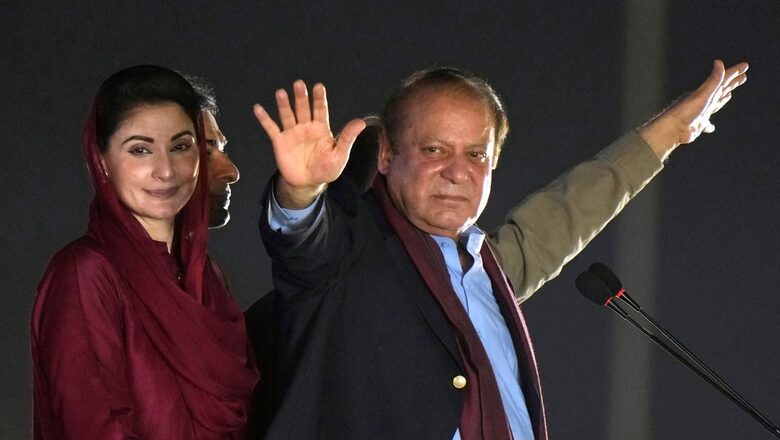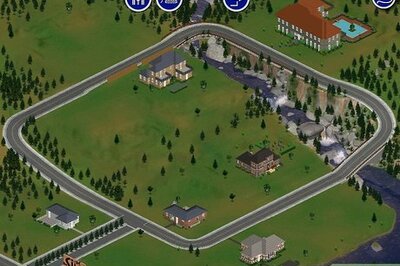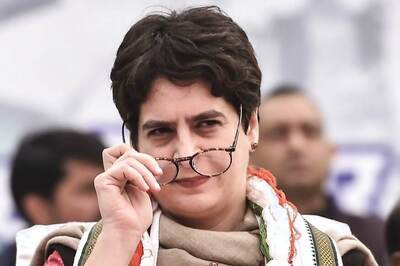
views
Three major challenges loom over Pakistan as three-time former Prime Minister and leader of Pakistan Muslim League (N) Main Muhammad Nawaz Sharif ended his four-year self-exile and triumphantly returned to Pakistan on October 21.
First is the challenge of how to transform Pakistan into an economically viable state with a vibrant private economic sector. Second is tackling political challenges the country has been facing for decades and ensuring that if elected for a fourth time, the military will give him a free governing hand. And finally, the resolution of the Kashmir conflict which, while addressing the mammoth public rally in Lahore on October 21, he has promised to resolve ‘amicably’.
Pakistan narrowly escaped default this summer after the International Monetary Fund (IMF) issued its first installment of a $3 billion bailout package worth $1.2 billion. Following the IMF dictates, Pakistan has seen a steep rise in inflation, cost of living and its interest rate which now stands at 22 per cent. The result is that people have begun protests and are falling behind in payments of electricity bills due to what the consumers say are ‘unreasonable’ additional taxes which have resulted in raising the per unit cost of electricity. Repayment of debt accumulated by previous governments including that of former Prime Minister Imran Khan is another challenge the future Nawaz Sharif government will have to face.
In 2014-15, Pakistan’s debt-GDP ratio stood at 62 per cent. By 2018, the ratio was 71.1 per cent and in 2019, it jumped to 81.8 per cent. It is estimated that between 2023 and 2026, Pakistan will have to repay debts (including service charges) worth $77.5 billion mainly to Chinese, Saudi Arabia and private creditors. Where is the money going to come from to make such a humungous payment?
The fundamental problem with Pakistan’s economy seems to be the lack of a sustainable manufacturing sector. Lack of electricity and power only aggravates the abysmal situation that the manufacturing sector is faced with. The agricultural sector is also in a dire state due to flash floods owed to the effects of climate change, lack of drainage systems, and saltation of water irrigation canals, as well as lack of seeds and fertilizer. The feudal system of landholding does not help either. The government cannot organise farming to meet its requirements for food and the large landowners have pledged their lands to banks for loans. Therefore, millions of hectares of land remain uncultivated.
Another challenging task in its own right that Nawaz Sharif faces is that of normalisation of trade relations with neighbouring Bharat. Pakistan has already fought four wars with Bharat over Kashmir and lost all four of them.
Now let us examine, in reverse order, the three challenges mentioned above Sharif has to wrestle with. Civil-military relations have never been smooth in Pakistan due to the direct influence and interference of the military in politics and parliamentary affairs. The corrupt Army generals sitting in GHQ jealously protect the economic business enterprise that the Pakistan Army has developed. Pakistani Army’s annual revenue stands at approximately $26.5 billion. It is the biggest business conglomerate in the country and employs close to three million people. From Fauji Foundation (1954), Askari Bank (1991), a retail and commercial bank owned by the Army, Askari Cement, Golf Clubs, telecommunications, bond investments, sugar mills, CNG station, Askari farms and seeds, Askari real estate, Bahria Foundation (Navy) and Defence Housing Authority to Shaheen Airlines, Pakistan military holds the private sector by the neck as a hangman’s noose.
Will Nawaz Sharif be able to challenge a business conglomerate worth 10 per cent of the country’s GDP? Pakistani military ruthlessly rules over its people. It uses the media, mosques and madrassas to instill fear of Bharat which they claim is weaving conspiracies against the Islamic Republic 24*7 and if it was not for the Pakistan army, Bharat would eat Pakistan alive. This narrative by-product and an extension of the two-nation theory of Muhammad Ali Jinnah gives them a pretext to interfere in politics and manoeuvre in the corridors of power to get favourites elected to the parliament as well as to the offices of prime minister and president.
How will Nawaz Sharif be able to weaken the grip of the military top brass without tackling their grip on the economy? This is a mind-boggling question. Without tackling the military, which has established a common perception that they are the guarantors of the being of the state of Pakistan, how can Nawaz Sharif even think of forming a popular coalition against the military?
In his speech at Minar e Pakistan in Lahore on October 21, Nawaz Sharif has already declared that he is not seeking revenge. This was an indication that he would not put former Army Chief General Qamar Javed Bajwa and former Director General of the ISI General Faiz Hammed on trial for conspiring against his elected government and installing Imran Khan as the country’s prime minister through a fraudulent election in 2018. If Nawaz Sharif comes to power with a weak and meek will to confront the military in the first place, how will he even start a process of negotiating with its neighbour for the reopening of the trade routes?
Already, the Pakistan Army is busy sabotaging any such prospect that Sharif might have in mind by intensifying cross-border terrorist infiltration and engaging with Indian security forces. On October 26- 27, alongside the Jammu border, at least three Bharati BSF personnel got wounded after being fired upon by Pakistan rangers for seven hours. On the same day, Bharati forces intercepted an infiltration bid by terrorists in Kupwara in the Muzhil sector in which at least five terrorists of Lashkar e Taiba were killed. Therefore, it is safe to say that Pakistan under Sharif will not be able to tackle the dominance of the military in political and economic sectors. Neither will Sharif be able to ‘amicably’ resolve the Kashmir conflict with Bharat.
In my opinion, he would be lucky if he completes the first two years of a five-year term. Hence, I don’t see Nawaz Sharif delivering anything concrete in terms of supremacy of the parliament and establishing a flourishing private sector economy while the military establishment keeps backstabbing democracy in Pakistan.
Dr Amjad Ayub Mirza is an author and a broadcaster from Mirpur in PoJK. He currently lives in the UK. Views expressed in the above piece are personal and solely those of the author. They do not necessarily reflect News18’s views.




















Comments
0 comment